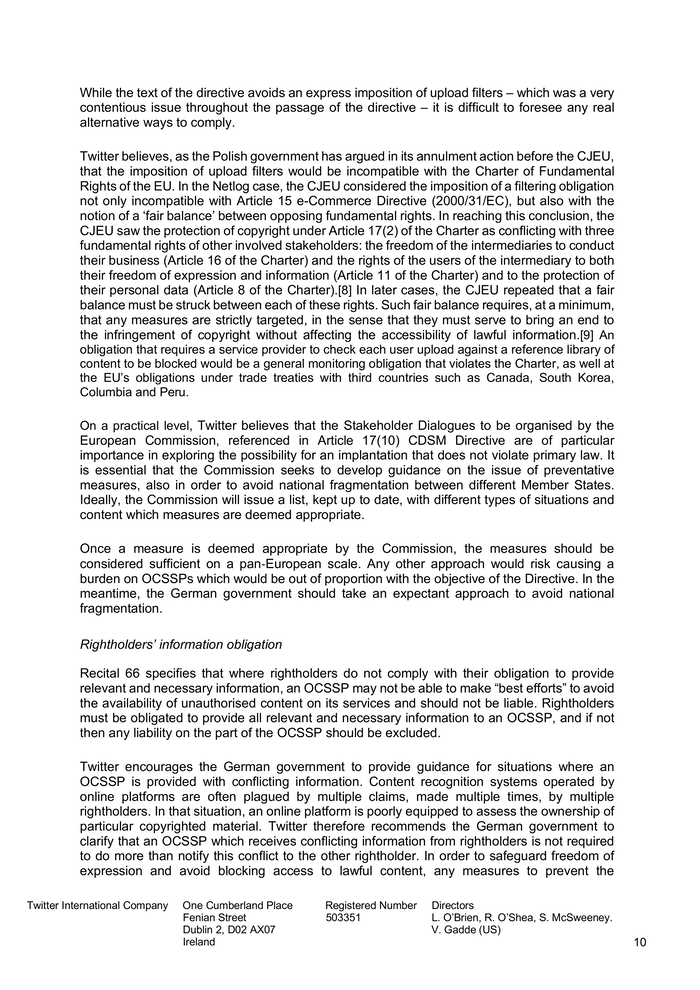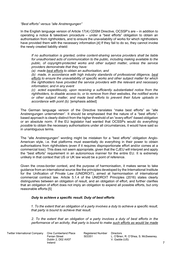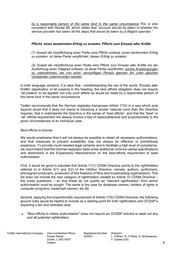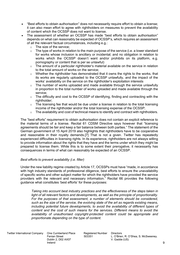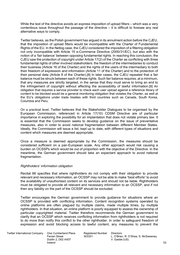Twitter_19-09-06.pdf
Dieses Dokument ist Teil der Anfrage „Stellungnahme von Twitter, Twitch, Exaring und Stiftung Preußischer Kulturbesitz zur Urheberrechtsreform“
Transposition of Directive 2019/790/EU on copyright and related rights in the Digital Single Market – Twitter’s response to the public consultation by the German Federal Ministry of Justice and Consumer Protection (BMJV) Not for online publication Submitted in PDF to konsultation-urheberrecht@bmjv.bund.de 6 September 2019 A. I. Introduction Twitter welcomes and appreciates the opportunity provided by the German government to participate in the public consultation relating to the transposition of the Copyright in the Digital Single Market Directive 2019/790 of 17 April 2019 (the “CDSM Directive”). This response is restricted to the transposition of Article 17 regarding the use of protected content by online content-sharing service providers. We note at the outset that Twitter’s current service does not fall within the scope of Article 17. However, both we and our users have an interest in ensuring that it is adopted in as precise and balanced a manner as possible, which respects the rights and interests involved and creates a predictable regulatory landscape for online content-sharing services. In that context, Twitter makes six main recommendations to the German government for a balanced, consistent and uniform transposition of Article 17 of the CDSM Directive in German: 1. Ensure that the statutory definition of “online content-sharing service provider” (“OCSSP”) only targets providers of information society services whose main purpose is to store and give the public access to a large amount of third-party copyright-protected works or other protected subject matter uploaded by their users, and only covers market-dominant platforms that compete directly with licensed content services for the same audience. The definition should specifically exclude providers whose services, judged on their main purpose, do not compete with licensed online streaming services. This will put beyond reasonable doubt that Twitter’s service is excluded from scope. 2. Explicitly transpose the proportionality requirement of Article 17(5) CDSM Directive in relation to all parts of Article 17(4), and clarify that licensing, filtering and notice & takedown require a careful balancing of different interests and rights and ensure that the relevant rights and interests of users and online platforms are also preserved. Twitter International Company One Cumberland Place Fenian Street Dublin 2, D02 AX07 Ireland Registered Number 503351 Directors L. O’Brien, R. O’Shea, S. McSweeney. V. Gadde (US) 1

3. Provide practical guidance on the proportional “best efforts” requirements to license, prevent availability and operate a notice & takedown procedure to improve legal certainty and facilitate compliance. 4. Introduce a presumption that users who have not self-identified as commercial users are covered by authorisations obtained by an OCSSP. 5. Introduce an indemnity for OCSSPs which have taken a good-faith decision in response to a user complaint, against claims from both users and rightholders if that decision is later overturned. 6. Clarify that OCSSPs can rely on users’ self-assessments that their upload falls under a copyright exception or limitation, unless and until notified otherwise by a competent authority. II. No comments III. No comments IV. No comments V. No comments VI. No comments VII. No comments VIII. No comments Twitter International Company One Cumberland Place Fenian Street Dublin 2, D02 AX07 Ireland Registered Number 503351 Directors L. O’Brien, R. O’Shea, S. McSweeney. V. Gadde (US) 2

IX. Twitter’s recommendations in more detail In setting out Twitter’s recommendations in more detail, we follow the structure provided for in the consultation document, in particular chapter IX concerning “Responsibility of Upload Platforms (Article 2(6), Article 17, and German Statement of 15 April 2019). 1. Platforms covered, act of communication to the public (Article 2(6), Article 17(1), first subparagraph, Article 17(3)) Article 2(6) of the CDSM Directive defines an ‘online content sharing service provider’ (“OCSSP”) as: a provider of an information society service of which the main or one of the main purposes is to store and give the public access to a large amount of copyright-protected works or other protected subject matter uploaded by its users, which it organises and promotes for profit-making purposes. The Article subsequently specifies a number of specific exemptions for services that would otherwise be subject to the (first part of the) definition of OCSSP: Providers of services, such as not-for-profit online encyclopedias, not-for-profit educational and scientific repositories, open source software-developing and-sharing platforms, providers of electronic communications services as defined in Directive (EU) 2018/1972, online marketplaces, business-to-business cloud services and cloud services that allow users to upload content for their own use, are not ‘online content- sharing service providers’ within the meaning of this Directive. Recital 62 of the CDSM Directive makes clear that the definition is focused on a specific subset of user-uploaded content platforms, and that the list of exemptions is non-exhaustive: Certain information society services, as part of their normal use, are designed to give access to the public to copyright-protected content or other subject matter uploaded by their users. The definition of an online content- sharing service provider laid down in this Directive should target only online services that play an important role in the online content market by competing with other online content services, such as online audio and video streaming services, for the same audiences. (…) Providers of services such as open source software development and sharing platforms, not- for-profit scientific or educational repositories as well as not-for-profit online encyclopedias should also be excluded from the definition of online content-sharing service provider. [emphasis added] This recital means that not just the services specifically carved out in the second paragraph of Article 2(6) are outside scope, but that a significantly broader range of services may fall outside scope (even if they meet the other parts of the definition), on the grounds that they do not compete with other, licensed online content services. This limited, specific targeting of Article 17, focusing only on services whose main purpose competes with other, licensed online content services for the same audiences, is also rightfully Twitter International Company One Cumberland Place Fenian Street Dublin 2, D02 AX07 Ireland Registered Number 503351 Directors L. O’Brien, R. O’Shea, S. McSweeney. V. Gadde (US) 3

acknowledged in the German position on Article 17 in the European Council dated 15 April 2019 (paragraph 6): The requirements laid down in Article 2(6) of the Directive must be addressed and clarified, since the rules are aimed solely at those market-dominant platforms which make large quantities of copyright-protected uploads accessible and which base their commercial business model on such a practice, i.e. services such as YouTube or Facebook. At the same time, we will make it clear that services such as Wikipedia, university repositories, blogs and forums, software platforms such as Github, special- interest offers without any connection to the creative industry, messenger services such as WhatsApp, sales portals or cloud services are not platforms within the meaning of Article 17. In order to ensure a full and proper transposition, and in the interests of legal certainty, it is essential that both Article 2(6) and the quoted excerpt from Recital 62 are transposed fully. The exclusions contained in the second paragraph of Article 2(6) and the recital are not merely illustrative, but are necessary to exclude certain non-targeted services that might otherwise fall within (a strict interpretation) of the definition. Even then, the assessment whether a specific service qualifies as an online content sharing service provider will remain an uncertain exercise in many cases. This uncertainty threatens to chill investment and innovation by existing and potential online service providers, both large and small, European and global. That is particularly problematic given the stark, binary consequences of qualifying as an OCSSP. Twitter therefore encourages the German government to give specific examples of the types of services that fall in and out of scope. Moreover, in order to ensure that the solution intended by the legislator is focused on the problem as identified by the legislator, Twitter suggests to clarify explicitly that only the amount of unlawfully uploaded third-party content must be taken into account in the assessment of whether a service qualifies as an OCSSP. Much of the content available on online services such as Twitter is first-party content (i.e. users uploading their own creations), or content uploaded lawfully (e.g., on the basis of a license, or an exception or limitation). These are not part of the licensing problem that Article 17 seeks to address, and should not be considered when assessing whether a “large amount” of content is being uploaded. Twitter as a service consists mainly of the uploading and sharing by users of licensed works, or of their own works. This interpretation is also supported in recital 82 of the CDSM Directive: Nothing in this Directive should be interpreted as preventing holders of exclusive rights under Union copyright from authorising the use of their works or other subject matter for free, including through non- exclusive free licences for the benefit of any users. Twitter believes it is precisely the combination of key features discussed above that excludes its operations from the definition of OCSSP. The main use case of Twitter is that it allows users to upload their own content, i.e. Tweets, rather than copyrighted third-party works. The fact that Twitter doesn’t compete, or seek to compete, with licensed audio and audiovisual content services is also obvious from its product design, which shows users their timeline, rather than videos, music or any other specific type or source of works. To the extent that users attach images to their Tweets, or include hyperlinks in them, the main use case is as an illustration of a point made in a Tweet, so that an exception or limitation (quotation, parody, etc.) will often be applicable. Twitter is neither a ‘market-dominant platform’ which makes large quantities of (let alone third-party, unlawfully uploaded) copyright-protected works accessible, nor does it build its business model on the exploitation of user-uploaded third-party copyrighted works. Twitter also does not compete with any licensed, paid audio or video streaming services. Its Twitter International Company One Cumberland Place Fenian Street Dublin 2, D02 AX07 Ireland Registered Number 503351 Directors L. O’Brien, R. O’Shea, S. McSweeney. V. Gadde (US) 4

users don’t access their Twitter feed to find and watch protected content online. They do so because they want to know and engage with what’s going on in the world, and what people are talking about. Thus, its service belongs in the list of out-of-scope services (together with Wikipedia, Github, WhatsApp) referred to in the German government statement. Twitter started with the idea of an individual using an SMS service to communicate with a small group. Its service is also often referred to as “microblogging”. Both types of services – an electronic communications service (SMS) and a (micro) blogging service – are expressly excluded from the definition of an OCSSP. A statutory definition along these lines would provide much needed legal clarity in conformity with the letter and spirit of the CDSM Directive, protecting the many permissible ways in which users interact with copyright-protected works online. They are also necessary to safeguard an interpretation of the CDSM Directive that allows a fair balance to be struck between the protected interests of rightholders and the exercise of the right to freedom of information and freedom to conduct a business by users and exempted online services. Twitter therefore recommends the following statutory definition: An online content-sharing service provider is a provider of an information society service, of which the main or one of the main purposes is to store and give access to a large amount of third-party protected works unlawfully uploaded by the users of the service, which it organises and promotes for profit making purposes. Providers of services, such as not-for-profit online encyclopedias, not-for-profit educational and scientific repositories, open source software-developing and-sharing platforms, providers of electronic communications services as defined in Directive (EU) 2018/1972, online marketplaces, business-to-business cloud services and cloud services that allow users to upload content for their own use, and services which do not compete with licensed online content services, are not ‘online content-sharing service providers’ within the meaning of this Article. 2. Licensing (Article 17(1), second subparagraph, Article 17(2)) Article 17(2) makes a distinction between commercial or profit-making and non-commercial users of an OCSSP. From the text of Article 17(2), it is clear that this encompasses both reproductions and communications to the public by (non-commercial) users. The CDSM Directive does not define the meaning of “acting on a commercial basis” or “generate significant revenues”. By means of example, while a user of Twitter who posts a Tweet once a year, with only a handful of views, will be clearly non-commercial, and Tweets of content by accounts owned by broadcasters may be clearly commercial, there is a lack of clarity as to where the line should be drawn. This potentially makes it very difficult for OCSSPs to determine whether their users are considered commercial or non-commercial users in certain situations. Social media influencers may for example be particularly difficult to categorise, especially when they are not (yet) very popular. This is an issue because OCSSPs will have to establish which of their users are commercial or not to assess whether they are at risk of liability or not, while the number of such professional users and the extent of such a liability may be substantial. There is a real risk that this will result in an onerous administrative burden where professional users for example have to indemnify Twitter International Company One Cumberland Place Fenian Street Dublin 2, D02 AX07 Ireland Registered Number 503351 Directors L. O’Brien, R. O’Shea, S. McSweeney. V. Gadde (US) 5

an OCSSP or demonstrate chain of title. For larger players this may not be particularly problematic, early-stage micro-professionals however are likely to be heavily impacted threatening the freedom of speech and entrepreneurship. Against this background it is reasonable to introduce a presumption that all users who do not self-identify as commercial entities are deemed non-professionals covered by an authorisation obtained by an OCSSP. Such presumption could be rebuttable, whereby rightholders can notify an OCSSP of accounts that in their view are clearly operated by a commercial entity. Only this way, an OCSSP and its ‘undeclared’ users alike would gain some comfort that they won’t accumulate significant liabilities while using the service during the early stage of their ventures. 3. Elimination of liability (Articles 17(4) and 17(5)) a. Make the principle of proportionality explicit and prominent Article 17(5) CDSM Directive makes clear that all three best efforts obligations of the new safe harbour for OCSSP’s (i.e. to license, to filter and to operate a notice & takedown procedure) are subject to the principle of proportionality, stipulating specific elements that must be taken into account: • the type, audience and size of the service and the type of works uploaded by users of the service, i.e. the kind of service provided; and • the availability of suitable and effective means and their cost for service providers, i.e. what is possible to do. In our view, the proportionality requirement should be transposed as part of an operative provision, since this represents an important safeguard to establish what measures of licensing, prevention, and notice & takedown can be deemed necessary to ensure an effective application of Article 17 CDSM Directive, while also observing the relevant rights and interests of both users and online platforms. Furthermore, it should be clear that all three best-efforts requirements of Article 17(4) are subject to the principle of proportionality. b. Clarify the “best efforts” requirement Introduction The principle of legal certainty is a cornerstone of the rule of law and has been protected since the very beginning of the European integration.[2] In the words of the CJEU, it requires that “community rules enable those concerned to know precisely the extent of the obligations which are imposed on them”.[3] A literal, word-for-word implementation of the official German language version of Article 17(4) and 17(5) would not meet this requirement. The wording of these provisions is ambiguous and suffers from significant translation issues in comparison to the English-language version of the CDSM Directive as negotiated by the EU legislators. Additional clarity is necessary so that OCSSP’s can ascertain unequivocally what their rights and obligations are under the new exemption from liability and take steps accordingly. Twitter International Company One Cumberland Place Fenian Street Dublin 2, D02 AX07 Ireland Registered Number 503351 Directors L. O’Brien, R. O’Shea, S. McSweeney. V. Gadde (US) 6

“Best efforts” versus “alle Anstrengungen” In the English language version of Article 17(4) CDSM Directive, OCSSP’s are – in addition to operating a notice & takedown procedure – under a “best efforts” obligation to obtain an authorisation from rightholders, and to ensure the unavailability of works for which rightholders have provided them with the necessary information.[4] If they fail to do so, they cannot invoke the newly created liability shield: If no authorisation is granted, online content-sharing service providers shall be liable for unauthorised acts of communication to the public, including making available to the public, of copyright-protected works and other subject matter, unless the service providers demonstrate that they have: (a) made best efforts to obtain an authorisation, and (b) made, in accordance with high industry standards of professional diligence, best efforts to ensure the unavailability of specific works and other subject matter for which the rightholders have provided the service providers with the relevant and necessary information; and in any event (c) acted expeditiously, upon receiving a sufficiently substantiated notice from the rightholders, to disable access to, or to remove from their websites, the notified works or other subject matter, and made best efforts to prevent their future uploads in accordance with point (b). [emphasis added] The German language version of the Directive translates “make best efforts” as “alle Anstrengungen unternehmen”. It should be emphasised that the nature of a “best efforts”- based approach is clearly distinct from the higher threshold of an “every effort”-based obligation or an absolute norm. If the EU legislator had wanted that OCSSPs would do everything possible to obtain the necessary authorisations under all circumstances, it would have said so in unambiguous terms. The “alle Anstrengungen” wording might be mistaken for a “best efforts” obligation Anglo- American style, i.e. that platforms must essentially do everything in their power to obtain authorisations from rightholders (even if it requires disproportionate effort and/or comes at a commercial loss). This does not seem appropriate, given that the CJEU will interpret and apply the “best efforts” requirement in an autonomous manner for the entire EU. It is extremely unlikely in that context that US or UK law would be a point of reference. Given the cross-border context, and the purpose of harmonisation, it makes sense to take guidance from an international source like the principles developed by the International Institute for the Unification of Private Law (UNIDROIT), aimed at harmonisation of international commercial contract law. Article 5.1.4 of the UNIDROIT Principles (2016) states clearly distinguishes between an obligation of result, and an obligation of effort, and further clarifies that an obligation of effort does not imply an obligation to expend all possible efforts, but only reasonable efforts:[5] Duty to achieve a specific result. Duty of best efforts 1. To the extent that an obligation of a party involves a duty to achieve a specific result, that party is bound to achieve that result. 2. To the extent that an obligation of a party involves a duty of best efforts in the performance of an activity, that party is bound to make such efforts as would be made Twitter International Company One Cumberland Place Fenian Street Dublin 2, D02 AX07 Ireland Registered Number 503351 Directors L. O’Brien, R. O’Shea, S. McSweeney. V. Gadde (US) 7

by a reasonable person of the same kind in the same circumstance.This is also consistent with Recital 66, which states that “account should be taken of whether the service provider has taken all the steps that would be taken by a diligent operator.” Pflicht, einen bestimmten Erfolg zu erzielen. Pflicht zum Einsatz aller Kräfte (1) Soweit die Verpflichtung einer Partei eine Pflicht umfasst, einen bestimmten Erfolg zu erzielen, ist diese Partei verpflichtet, diesen Erfolg zu erzielen. (2) Soweit die Verpflichtung einer Partei eine Pflicht zum Einsatz aller Kräfte bei der Ausführung einer Tätigkeit umfasst, ist diese Partei verpflichtet, solche Anstrengungen zu unternehmen, die von einer vernünftigen Person gleicher Art unter gleichen Umständen unternommen würden. In both language versions, it is clear that - notwithstanding the use of the words “Einsatz aller Kräfte” [application of all powers] in the heading, the best efforts obligation does not require “all powers” to be applied, but only such efforts as would be made by a reasonable person of the same kind in the same circumstance. Twitter recommends that the German legislator transposes Article 17(4) in a way which puts beyond doubt that it does not intend to introduce a stricter national norm than the Directive requires, that it understands the Directive in the sense of “best efforts”, and that the “best” or “all” efforts-requirement will always involve a test of reasonableness and proportionality in the given circumstances of an individual case. Best efforts to license We would emphasise that it will not always be possible to obtain all necessary authorisations, and that measures to prevent availability may not always be effective or prohibitively expensive. To provide much-needed legal certainty and to facilitate a high level of compliance, we recommend that the German legislator adds some additional common-sense specifications and distinctions in the Explanatory Memorandum on the best-efforts requirement to seek authorisation. First, it would be good to stipulate that Article 17(1) CDSM Directive points to the rightholders referred to in Article 3(1) and 3(2) of the InfoSoc Directive, namely: authors, performers, phonogram producers, producers of first fixations of films and broadcasting organisations. This list does not include the new category of rightholders created by Article 15 CDSM Directive – the press publishers – so that these do not qualify as “relevant rightholders” from whom authorisation must be sought. The same is the case for database owners, holders of rights in computer programs, trademark owners, etc.[6] Second, applying the proportionality requirement of Article 17(5) CDSM Directive, the following ground rules would be helpful to include as a starting point for both rightholders and OCSSP’s exploring a fair and workable deal: • “Best efforts to obtain authorisation” does not require an OCSSP actively to seek out any and all potential rightholders. Twitter International Company One Cumberland Place Fenian Street Dublin 2, D02 AX07 Ireland Registered Number 503351 Directors L. O’Brien, R. O’Shea, S. McSweeney. V. Gadde (US) 8
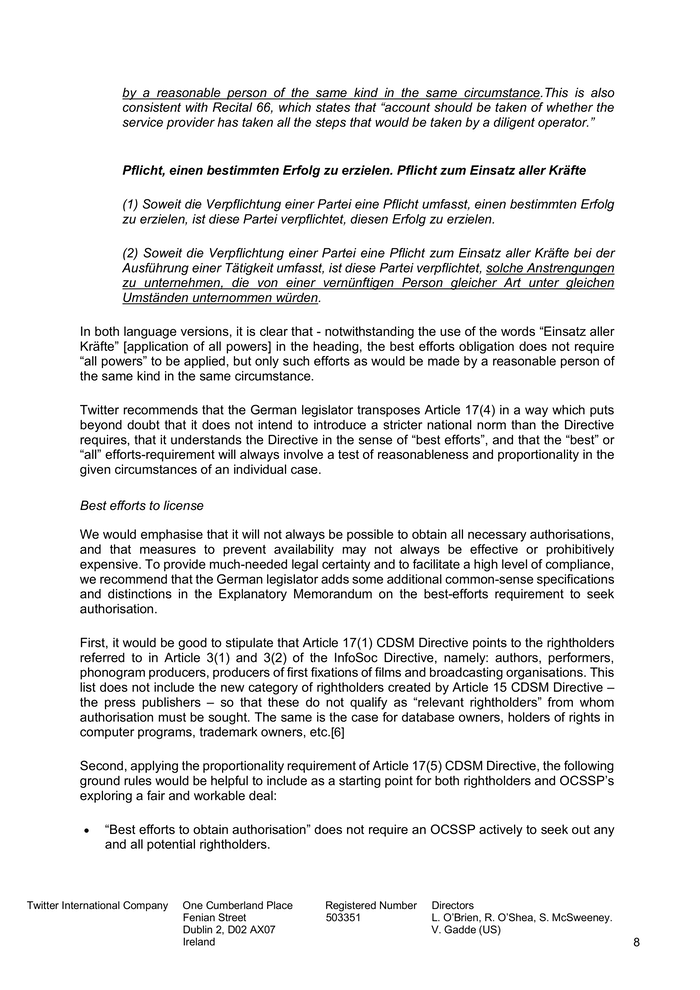
• • “Best efforts to obtain authorisation” does not necessarily require effort to obtain a license; it can also mean effort to agree with rightholders on measures to prevent the availability of content which the OCSSP does not want to license. The assessment of whether an OCSSP has made “best efforts to obtain authorisation” depends on what can reasonably be expected of OCSSP’s, which requires an assessment of all the relevant factual circumstances, including e.g.: o The size of the service; o The type of works in relation to the main purpose of the service (i.e. a lower standard for works whose inclusion is ancillary or incidental; and no obligation in relation to works which the OCSSP doesn’t want and/or prohibits on its platform, e.g. pornography or content that is per se unlawful) o The amount of a particular rightholder’s material available on the service in relation to the total amount of works on the service; o Whether the rightholder has demonstrated that it owns the rights to the works, that its works are regularly uploaded to the OCSSP unlawfully, and the impact of the works’ availability on the service on the rightholder’s exploitation interests o The number of works uploaded and made available through the service unlawfully in proportion to the total number of works uploaded and made available through the service; o The difficulty and cost to the OCSSP of identifying, finding and contracting with the rightholder; o The licensing fee that would be due under a license in relation to the total licensing income of the rightholder and/or the total licensing expense of the OCSSP; o The availability and cost of technical means to identify and contract with rightholders. The “best efforts” requirement to obtain authorisation does not contain an explicit reference to the material terms of a license. Recital 61 CDSM Directive says however that “licensing agreements should be fair and keep a fair balance between both parties.” The statement of the German government of 15 April 2019 also highlights that rightholders have to be cooperative and reasonable in their royalty demands.[7] That is not a given. Twitter has repeatedly experienced difficulties in licensing rights. In its experience, rightholders are not always willing to provide information about the rights that they have and the terms under which they might be prepared to license them. While this is to some extent their prerogative, it necessarily has consequences in terms of what can reasonably be expected of an OCSSP. Best efforts to prevent availability (i.e. filter) Under the new liability regime created by Article 17, OCSSPs must have “made, in accordance with high industry standards of professional diligence, best efforts to ensure the unavailability of specific works and other subject matter for which the rightholders have provided the service providers with the relevant and necessary information.” Recital 66 provides the following guidance what constitutes ‘best efforts’ for these purposes: Taking into account best industry practices and the effectiveness of the steps taken in light of all relevant factors and developments, as well as the principle of proportionality. For the purposes of that assessment, a number of elements should be considered, such as the size of the service, the evolving state of the art as regards existing means, including potential future developments, to avoid the availability of different types of content and the cost of such means for the services. Different means to avoid the availability of unauthorised copyright-protected content could be appropriate and proportionate depending on the type of content. Twitter International Company One Cumberland Place Fenian Street Dublin 2, D02 AX07 Ireland Registered Number 503351 Directors L. O’Brien, R. O’Shea, S. McSweeney. V. Gadde (US) 9
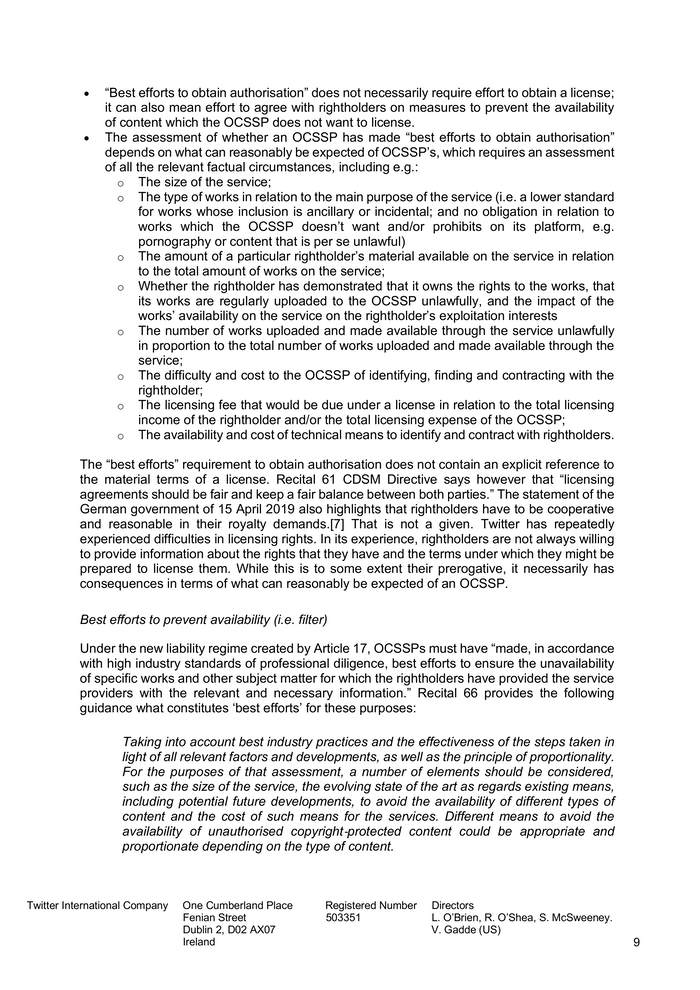
While the text of the directive avoids an express imposition of upload filters – which was a very contentious issue throughout the passage of the directive – it is difficult to foresee any real alternative ways to comply. Twitter believes, as the Polish government has argued in its annulment action before the CJEU, that the imposition of upload filters would be incompatible with the Charter of Fundamental Rights of the EU. In the Netlog case, the CJEU considered the imposition of a filtering obligation not only incompatible with Article 15 e-Commerce Directive (2000/31/EC), but also with the notion of a ‘fair balance’ between opposing fundamental rights. In reaching this conclusion, the CJEU saw the protection of copyright under Article 17(2) of the Charter as conflicting with three fundamental rights of other involved stakeholders: the freedom of the intermediaries to conduct their business (Article 16 of the Charter) and the rights of the users of the intermediary to both their freedom of expression and information (Article 11 of the Charter) and to the protection of their personal data (Article 8 of the Charter).[8] In later cases, the CJEU repeated that a fair balance must be struck between each of these rights. Such fair balance requires, at a minimum, that any measures are strictly targeted, in the sense that they must serve to bring an end to the infringement of copyright without affecting the accessibility of lawful information.[9] An obligation that requires a service provider to check each user upload against a reference library of content to be blocked would be a general monitoring obligation that violates the Charter, as well at the EU’s obligations under trade treaties with third countries such as Canada, South Korea, Columbia and Peru. On a practical level, Twitter believes that the Stakeholder Dialogues to be organised by the European Commission, referenced in Article 17(10) CDSM Directive are of particular importance in exploring the possibility for an implantation that does not violate primary law. It is essential that the Commission seeks to develop guidance on the issue of preventative measures, also in order to avoid national fragmentation between different Member States. Ideally, the Commission will issue a list, kept up to date, with different types of situations and content which measures are deemed appropriate. Once a measure is deemed appropriate by the Commission, the measures should be considered sufficient on a pan-European scale. Any other approach would risk causing a burden on OCSSPs which would be out of proportion with the objective of the Directive. In the meantime, the German government should take an expectant approach to avoid national fragmentation. Rightholders’ information obligation Recital 66 specifies that where rightholders do not comply with their obligation to provide relevant and necessary information, an OCSSP may not be able to make “best efforts” to avoid the availability of unauthorised content on its services and should not be liable. Rightholders must be obligated to provide all relevant and necessary information to an OCSSP, and if not then any liability on the part of the OCSSP should be excluded. Twitter encourages the German government to provide guidance for situations where an OCSSP is provided with conflicting information. Content recognition systems operated by online platforms are often plagued by multiple claims, made multiple times, by multiple rightholders. In that situation, an online platform is poorly equipped to assess the ownership of particular copyrighted material. Twitter therefore recommends the German government to clarify that an OCSSP which receives conflicting information from rightholders is not required to do more than notify this conflict to the other rightholder. In order to safeguard freedom of expression and avoid blocking access to lawful content, any measures to prevent the Twitter International Company One Cumberland Place Fenian Street Dublin 2, D02 AX07 Ireland Registered Number 503351 Directors L. O’Brien, R. O’Shea, S. McSweeney. V. Gadde (US) 10
